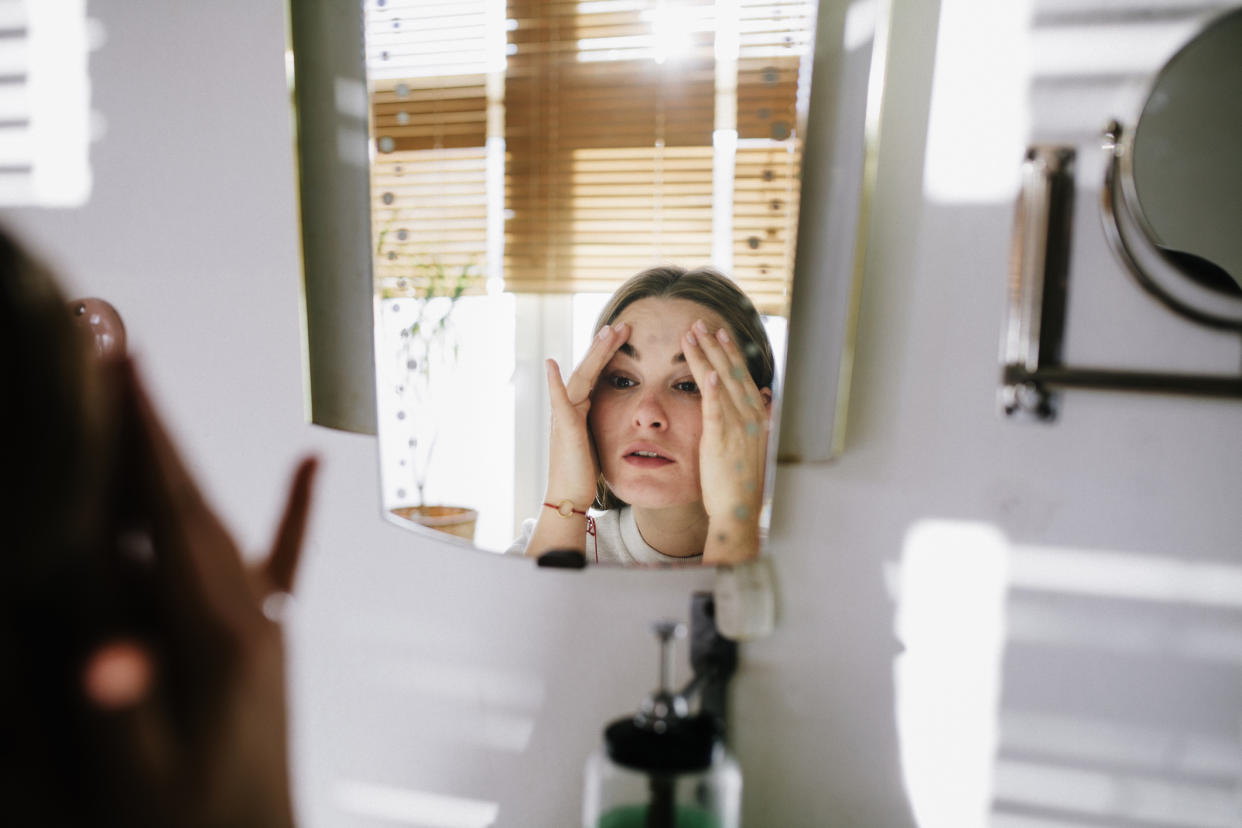What is the ‘moon face’ trend and can stress really change your face shape?

Another day, another beauty term trending in the TikTok wellbeing world. While some we can take with a pinch of Epsom salt, the latest has stressed out Brits worried rising cortisol levels could be causing them to experience a puffy face.
A condition dubbed 'moon face', but also known as 'cortisol face', refers to a potential skin side effect of having too high levels of the stress hormone - cortisol - in the body.
Before you start googling stress-relievers due to fear of facial bloating, experts are warning those worried not to panic just yet.
"While chronic high cortisol levels can lead to facial swelling, this is usually seen in more severe endocrine disorders rather than in the everyday stress most people experience," Dr Vijay Murthy, a functional medicine doctor and co-founder of Harley Street clinic Murthy Health.
What is 'moon face'?
Dr Murthy says cortisol face, or 'moon face' is a term often associated with a round, puffy appearance due to high levels of cortisol, particularly in the context of medical conditions like Cushing's syndrome.
"However, the concept of cortisol face trending on social media as a common phenomenon for everyone experiencing stress is largely a myth," he adds.
The phenomenon gets its name due to the fact that it’s believed to cause extra fat on the face, which gives it a puffy or ‘moon face’ appearance.
While high levels of the hormone can lead to facial swelling or inflammation, Dr Murthy says it is extremely rare to experience this through general stress.
"It is unlikely for someone to experience cortisol face from mild or even moderate stress," he explains. "Cortisol face is more commonly associated with severe endocrine disorders like Cushing's syndrome, where there is a significant and prolonged elevation of cortisol levels.
"Everyday stress, even if chronic, does not typically elevate cortisol to the levels needed to produce such a pronounced physical change."

The link between stress and a puffy face
While we may not have to worry too much about our face puffing up when we're feeling stressed out, that's not to say the emotion doesn't have an impact on our skin.
"Most inflammatory skin conditions and autoimmune conditions have stress (emotional or physical) as a trigger," explains Dr Karishma Hemmady, consultant dermatologist at Stratum Clinics.
"Stress can be a significant factor that can influence skin conditions such as acne, although the exact mechanisms and the extent of their impact can vary among individuals."
While the relationship between stress and our skin is complicated Dr Hemmady says there are a number of ways periods of worry can have a knock on impact on our faces.
Cortisol production: Stress triggers the release of cortisol, a hormone that can increase sebum production and inflammation, both of which can contribute to acne.
Behavioural factors: Stress can lead to behaviours such as poor dietary choices, lack of sleep, and neglect of skincare routines, all of which can exacerbate acne and other skin conditions.
Immune system: Chronic stress can weaken the immune system, making the skin more susceptible to infections and slower to heal from say acne lesions.
"People often underestimate the impact that stress can have on the skin," explains skin and aesthetics expert, Nina Prisk, from Update Aesthetics.
"It causes a chemical change in the body that directly impacts skin, and research has shown that stress and skin conditions are closely linked."
Prisk says stress can cause the following unlikely symptoms:
Dry, flaky skin
"When you’re experiencing a stressful situation your adrenaline surges and this can make you sweat more which can then lead to dehydration of the skin," Prisk explains. "Dehydrated skin usually manifests itself with dryness and flaking".
Rash
Your body releases adrenaline and cortisol when you’re stressed, and these stress hormones affect the flow of blood to your skin and can result in a skin irritation or rash.
Rosacea
Stress can lead to inflammatory conditions such as Rosacea, which causes redness on the nose, cheeks, forehead, chin and neck and for some people visible blood vessels too. "For some it also comes with a stinging sensation or burning feeling when using water or skincare products," Prisk adds.
Acne
Although stress does not usually cause acne, studies show that it can exacerbate skin conditions such as acne, triggering flare-ups.
"It’s believed that this could be caused by the stress hormone, cortisol, entering the bloodstream and increasing the production of sebum, a natural oil," Prisk explains. "An increase in sebum production can cause pores to become clogged and aggravate acne. This, combined with the fact that skin heals itself much slower when under stress and people who are stressed are more prone to pick and scratch their skin, means that acne can be more noticeable for longer during stressful periods."

How to treat skin issues exacerbated by stress
To manage skin conditions effectively, Dr Hemmady says it is important to consider an integrative approach that includes:
Balanced diet: "Focus on low glycemic index foods, reduce dairy and unhealthy fats, and increase intake of omega-3 fatty acids and antioxidants," she adds.
Adequate sleep: Dr Hemmady suggests aiming for 7-9 hours of quality sleep per night to support skin health and hormonal balance.
Stress management: Practice stress-reducing techniques such as exercise, meditation, deep breathing exercises, and mindfulness to help control cortisol levels and maintain healthy skin.
"By addressing these lifestyle factors, individuals may see improvements in their skin conditions alongside other treatments recommended by healthcare providers," Dr Hemmady adds.
If you are experiencing a puffier than usual face, Dr Murthy says it is essential to differentiate between occasional puffiness and persistent swelling.
"While lifestyle changes can help with mild symptoms, persistent facial swelling may indicate an underlying health issue that requires medical attention," he adds. "Additionally, it's important to approach social media trends critically and rely on evidence-based information for health concerns."
Skin care read more:
Doctor reveals the ‘5 K rule’ to follow for better skin and gut health (Yahoo Life UK, 3-min read)
What is the ‘morning shed’ skincare routine and are there any benefits? (Yahoo Life UK, 6-min read)
What is the face taping TikTok trend and can it really banish wrinkles? (Yahoo Life UK, 7-min read)


